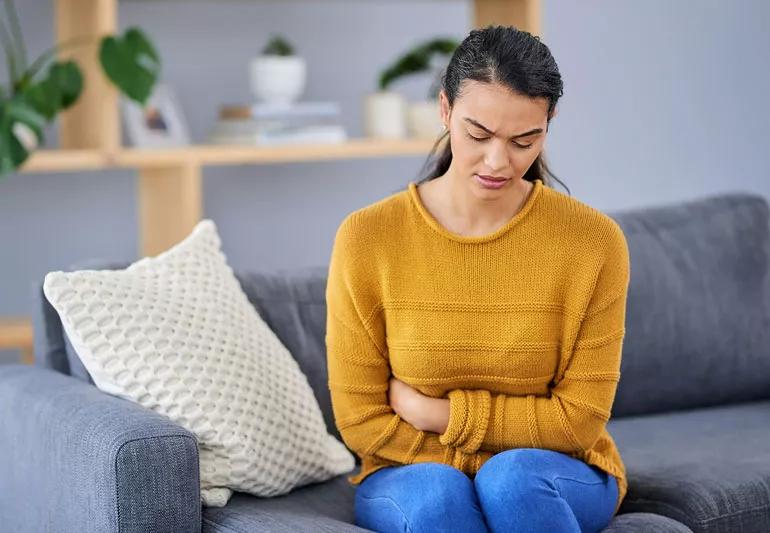Understanding what a 'gallbladder attack' feels like

Image content: This image is available to view online.
View image online (https://assets.clevelandclinic.org/transform/6f338315-9b41-44e4-8092-b3e558f06866/gallBladderPain-1139922820-770x553_jpg)
Woman sitting on couch with stomach pain
There’s a lot going on in your body between your chest and your pelvis. So when abdominal pain strikes, it can be nearly impossible to tell where it’s coming from.
Advertisement
Cleveland Clinic is a non-profit academic medical center. Advertising on our site helps support our mission. We do not endorse non-Cleveland Clinic products or services. Policy
If the pain is in the upper part of the abdomen, some people wonder if they should blame their gallbladder – the tiny, pear-shaped organ that sits under the liver on the right side of your abdomen. It’s a fairly common cause of upper abdominal pain, but it’s not the only potential cause.
Are there certain clues that suggest a gallbladder problem? Gastroenterologist Michael Kirsch, MD, explains how this organ works and some of the classic gallbladder symptoms.
Most of the time, the gallbladder just stores bile produced by the liver. Bile helps to break down fats, so when you eat a meal, the gallbladder gets to work squeezing some of that bile into the intestine to help with digestion.
If bile contains too much of one or more of its components, it can harden into pebble-like gallstones, which can block the flow of bile.
“In most people, stones never cause any symptoms,” Dr. Kirsch says. (You could have one right now and not even realize it!) If these “silent” stones are discovered accidentally during other medical tests or procedures, there’s no need to do anything about them.
But sometimes, the blockage creates a buildup of pressure in the gallbladder and causes pain. That’s a gallbladder attack.
Advertisement
Even for a skilled physician, it can be difficult to tell whether someone’s gallbladder is the source of their abdominal pain. That’s because a number of things can cause localized pain in the abdomen, including a peptic ulcer or a heart attack.
In typical cases, gallbladder pain:
“The pain can be spontaneous and not necessarily restricted to meal time — it can awaken someone at night,” Dr. Kirsch says.
Certain people are more likely to have gallbladder problems, including anyone who is:
Sometimes, gallstones resolve themselves. Other times, they get stuck in the gallbladder or in the bile ducts and cause recurring pain.
If you have pain that you suspect is related to your gallbladder, see a gastroenterologist to help you get to the bottom of it.
It might be helpful to keep a record of when and where you experience symptoms.
“The most important tool for a physician is listening very carefully to the patient’s medical history,” Dr. Kirsch says. “That is by far the most valuable piece of data that the physician will have available – even more valuable than an ultrasound or CAT scan or laboratory blood tests.”
If your doctor suspects gallstones as the culprit, they may order one of those tests for confirmation.
If the gallbladder is deemed to be the source of the problem, your doctor might recommend gallbladder removal surgery.
This probably sounds like a dramatic step, but the reality is that you don’t actually need your gallbladder to live a happy, healthy life. Your liver can release bile directly into the intestines to help with digestion. And, the gallbladder can be removed with a laparoscope.
“The vast majority of everyone who has their gallbladder removed lives perfectly well,” Dr. Kirsch says.
Because of all of the possible causes, it’s important to tread carefully when it comes to abdominal pain.
If the pain is severe, gets worse or is accompanied by sweating, shortness of breath, or bloody vomit or stool, it’s worth a trip to the ER.
“It can be a difficult call with all the abdominal pain that we see as to whether the gallbladder is responsible or there’s some other cause,” Dr. Kirsch says. “It takes experience and judgment.”
Advertisement

Delivered every Tuesday!
Sign up for our Health Essentials emails for expert guidance on nutrition, fitness, sleep, skin care and more
Learn more about our editorial process.
Advertisement
Pain on your right side between your rib cage and hip bone warrants immediate treatment
A healthy gut benefits your entire digestive system — and more
A digestive disease expert explains
Understand all the causes + when to see your doctor
One is related to your urinary system, while the other is related to your digestive system
Most recommended precautions center around minimizing bruising or swelling
Even one drink can have an impact on your cognitive function leading to slurred speech, blurred vision and impaired memory
Type 2 diabetes isn’t inevitable with these dietary changes
Applying a hot or cold compress can help with pain
Pump up your iron intake with foods like tuna, tofu and turkey